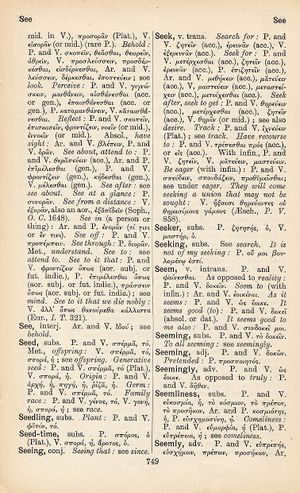seem: Difference between revisions
From LSJ
Θυμῷ χαρίζου μηδέν, ἄνπερ νοῦν ἔχῃς → Si mens est tibi, ne cedas iracundiae → Dem Zorn sei nicht zu Willen, bist du bei Verstand
(CSV5) |
m (Text replacement - "<b class="b2">to</b>" to "to") |
||
| Line 10: | Line 10: | ||
<b class="b2">As it seems</b>: P. and V. ὡς ἔοικε. | <b class="b2">As it seems</b>: P. and V. ὡς ἔοικε. | ||
<b class="b2">It seems good</b> ( | <b class="b2">It seems good</b> (to): P. and V. δοκεῖ (absol. or dat.). | ||
<b class="b2">It seems good to me also</b>: P. and V. συνδοκεῖ μοι. | <b class="b2">It seems good to me also</b>: P. and V. συνδοκεῖ μοι. | ||
}} | }} | ||
Revision as of 15:25, 20 September 2019
English > Greek (Woodhouse)
v. intrans.
P. and V. φαίνεσθαι.
As opposed to reality: P. and V. δοκεῖν.
Seem to (with infin.): Ar. and V. ἐοικέναι.
As it seems: P. and V. ὡς ἔοικε.
It seems good (to): P. and V. δοκεῖ (absol. or dat.).
It seems good to me also: P. and V. συνδοκεῖ μοι.

